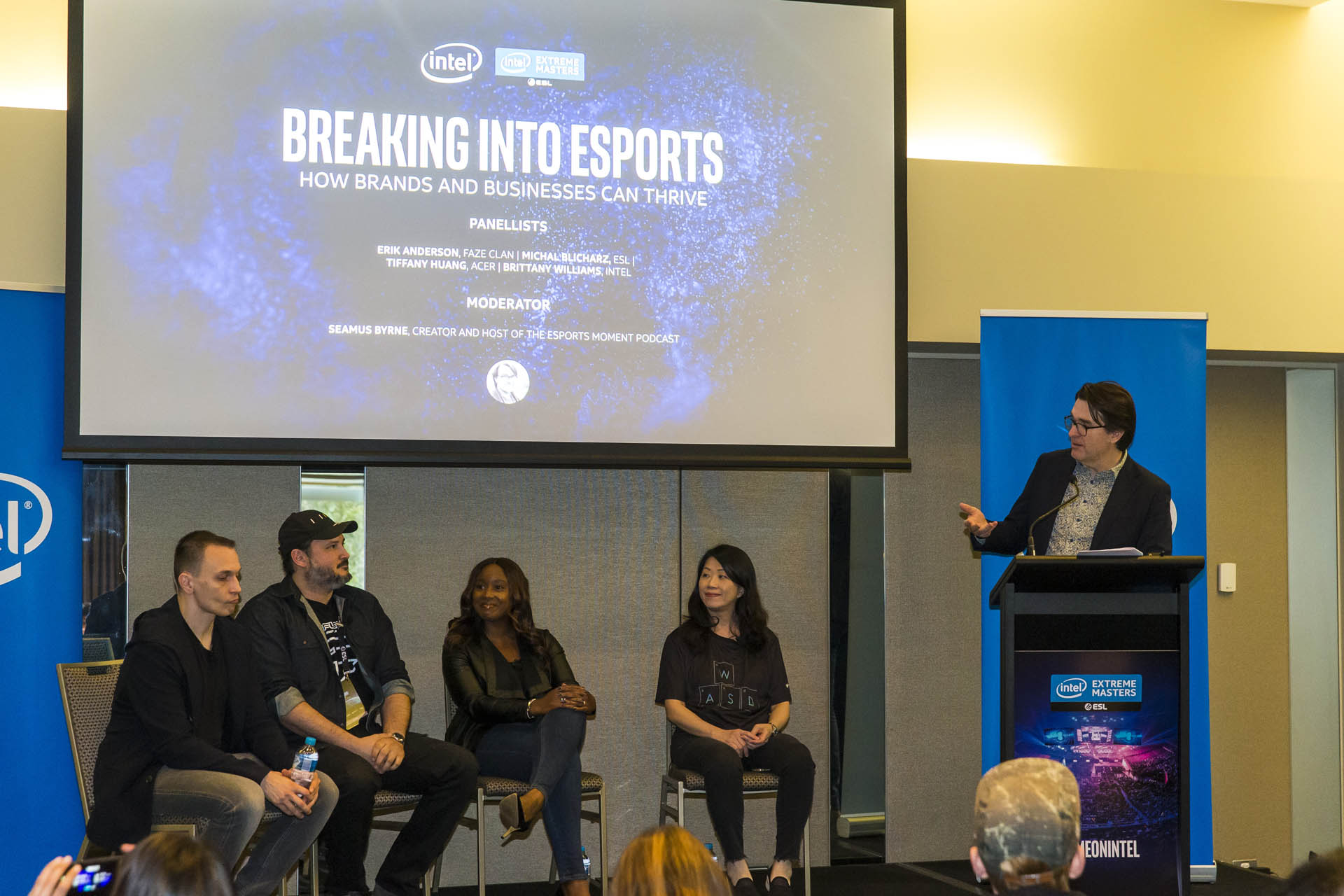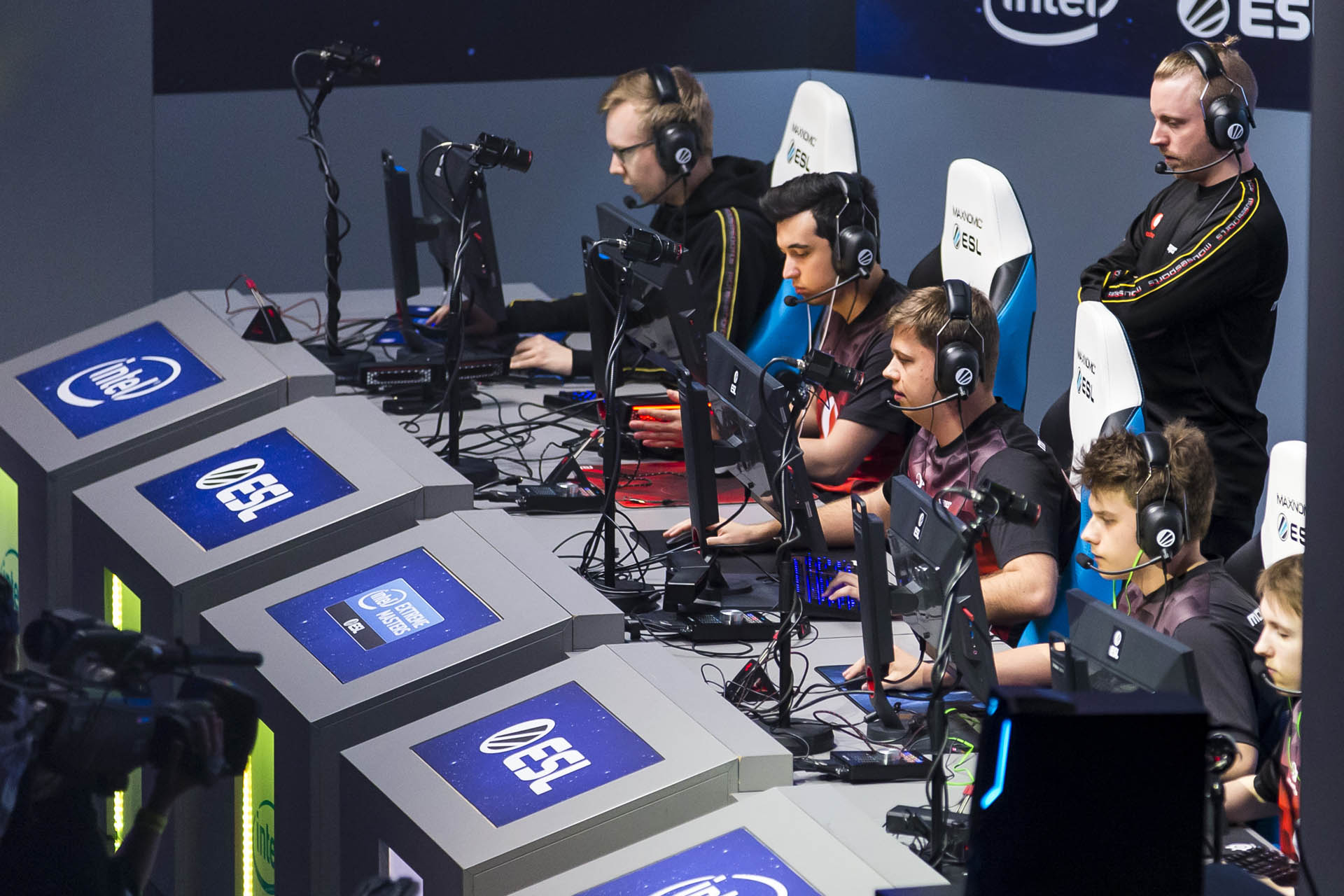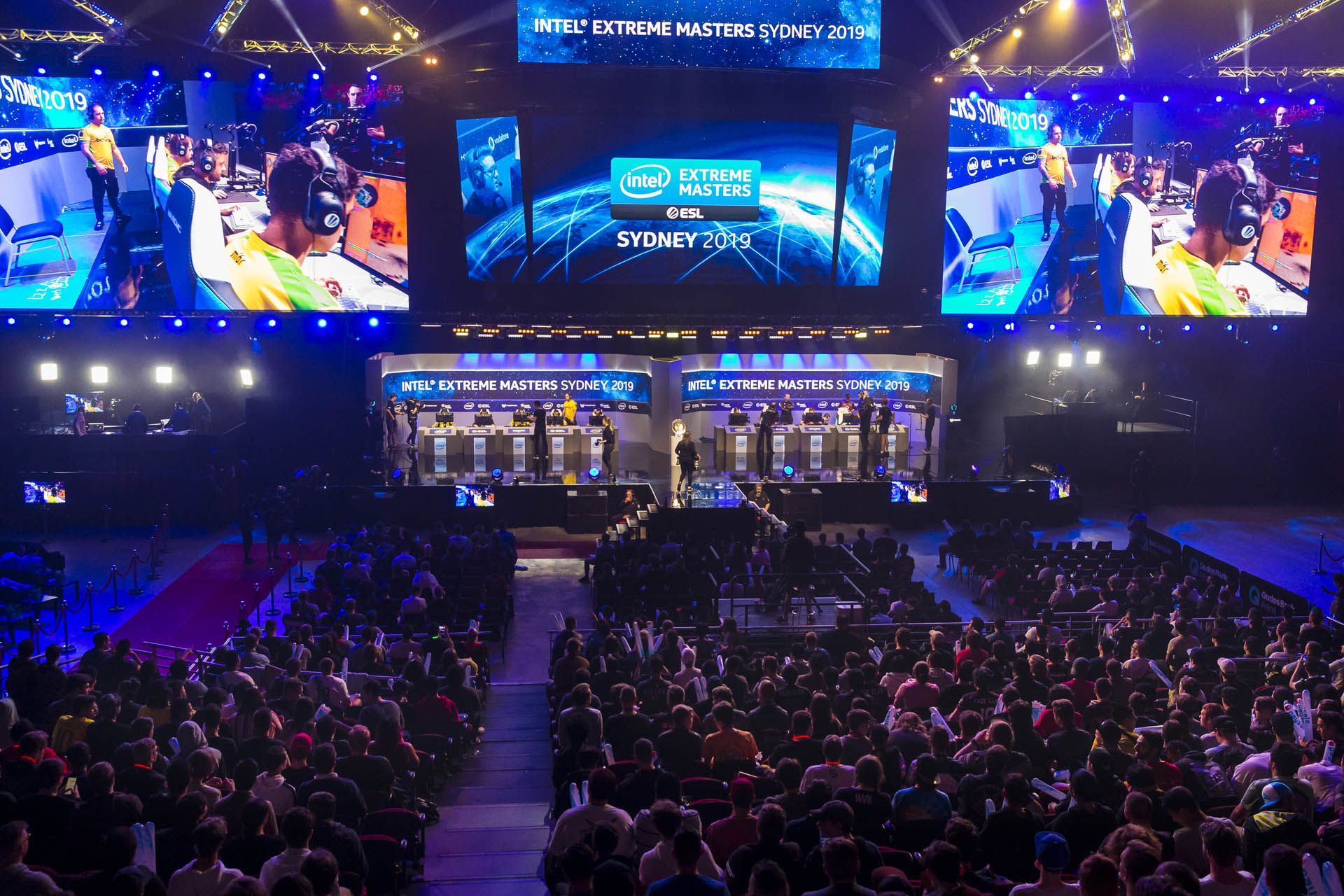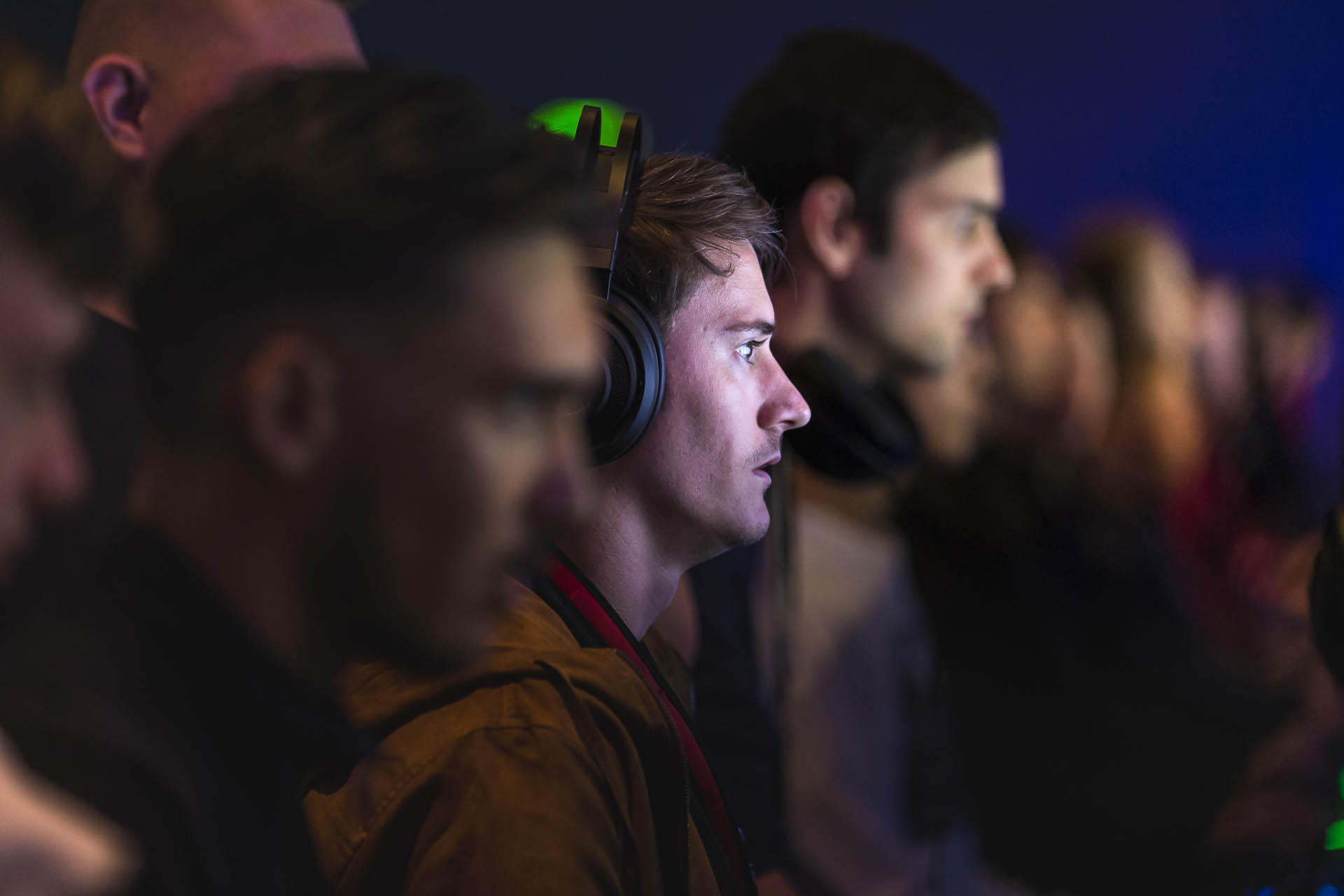The Intel Extreme Masters roared in to Sydney on the first weekend of May as thousands of PC Gamers and eSports enthusiasts packed into Sydbey’s Olympic Park Stadium to support their favourite teams.
STG was a guest of Intel and during our coverage of the event, Shane was invited to have a sit down and chat with Lee Machen, the General Manager of Gaming and VR / AR at Intel.

Lee Machen – General Manager – Video Gaming, VR / AR @ Intel
Shane: Hi Lee, thanks for sitting down and talking to us here at STG. Can you tell us how you ended up in the Video Gaming / eSports side of Intel?
Lee: I have been it until for 23 years. And for roughly the first half of that time, I was in different positions in engineering and marketing. I’ve worked in our data center products, I’ve worked in our, sort of, embedded products, I tried to put chips in cars a long time ago before, it’s actually going to work this time. But that time, we were too early. But I was working in the in a software group.
Back when we started building our previous attempt at getting into discrete graphics, we were working on a high end distant desktop graphics card, codenamed Larrabee, and in the software group, we realized that, in order for people to get the value out of that graphics card, we had to make sure that the key pieces of software, were ready to go for the unique architecture that we were building. And so since graphics cards are aimed at gamers, we acquired a physics company in Ireland called Havoc. And after we acquired them, I went to go live in Ireland and basically work with Havoc, and help them achieve the goals that we had set for them after they joined us at Intel, and how it was entirely a game focused company.
So, they sell the physics middleware into all of the major game makers in the world. Their customers, include Ubisoft, EA, Take Two, you know, all the major game companies. And so that’s really where I for the first time got immersed in gaming, and really got to understand how the gaming business works primarily from the software side, but there was, you know, a fair amount of hardware involved there as well. So then I expanded my role to be managing a team within within Intel, that worked with all of the game middleware companies, as well as the major game publishers in the world. So we were sort of the Developer Relations team. I had someone on my team who worked with EA and someone on my team who worked with Ubisoft, and someone on my team that worked with Epic and Valve and everybody else you can think of. And so I really got to understand the games industry through working with those publishers, and trying to, you know, help them align with the hardware that we were bringing to market.
So the primary role of Developer Relations in a hardware company, is to make sure that when your hardware comes out, the software needs to be ready to take advantage of it and show the benefits of that hardware. And so that’s how I got involved in gaming. And I did that for about 10 years. And then a few years ago, I joined the the sales side of gaming, and shifted my focus a bit from focusing only on software developers, to now focusing on OEM our customers.
But in order to help our OEM, you also need to focus on the end user path to market. So retail, online retail customers that buy from system builders or build their own PCs, there’s a bunch of different ways that gaming hardware gets to the end user. And we have to work to make sure all of that works as efficiently as possible to sell CPUs, you know, like a box to CPU directly to the consumer, or to help make sure that Dell or HP, that the PCs they’re building, also make it to the end consumer. So that was sort of my path into gaming, right. And I’ve now been involved in gaming for, you know, 12 years or something like that. And I hope to never leave gaming, because it’s a really unique place to be. You get to know the ecosystem, you get to know people in the game studios, and a lot of them switch companies, but a lot of but most of them never leave the games industry, because it’s a pretty amazing place to work.

Shane: Are you a gamer yourself?
Lee: I am a over 40 parent gamer, which means I’m a gamer that doesn’t game very much at all. And I don’t have a lot of time to actually learn new games. So when I do have time to play, I tend to play the games that I already know, rather than spending hours and hours learning new mechanics and that sort of thing. And a couple of years ago, my kids and I really got into PUBG. So we have we have a room set up with three PCs. And the three of us play PUBG together whenever we have the time.
Shane: So Intel, from CPUs to major eSports competitions how did this transition come about?
Lee: Well, some of this I’m going to be talking about based on what I’ve been told, because I wasn’t there when it started. But I was at Intel, I just wasn’t focused on gaming at the time. So ESL was based in Germany, I think they’re still based in Germany. And some of those guys got to know some of the folks on our German side, you know, local sales team. And they started working on ‘Hey, wouldn’t it be cool to have, you know, if Intel sponsored an Intel gaming night’ or something like that. And so this is, in the very early days, not the ESL that we have now that puts on major Stadium events all over the world, right?
We were still starting out in gaming, they were basically just getting started and the world wasn’t ready for Stadium events. Anyway, Twitch didn’t exist. You know, most people didn’t have very fast network connections at home. So multiplayer gaming, unless you were located in a single room wasn’t really possible. So you know, they basically started putting together I think it was called Intel Game Night or something like that, in Germany, and it all basically grew from there. Then they started putting on bigger and bigger Competitions with adding the ability for people to watch. on what was peer to peer type software that was very low resolution. And it only worked with like, hundreds, or maybe a couple thousand people watching at a time, nothing like nothing like what we have now. And fortunately for us, we decided to stick with it year after year and add more events and you know, constantly tweak the format of those events and the location of those events. Then in about 2006, I think, we started calling it Extreme Masters. And we’re now in Season 14 of that. And in those 14 years We’ve done 75 different IEM events, in all in places all around the world. If you just give me one second, there’s a couple other statistics I am that are pretty interesting.
Yeah, 75 events, 14 years, 15 countries, 31 different cities that we’ve been able to do this. So I look at how big companies allocate their budgets. And I think it’s, it’s great that we had enough leaders with enough understanding of how important this was that we stuck with it, and we’re able to help work with ESL to grow to this level.

Intel Extreme Masters 2019, Sydney Olympic Park – (Photo by Andrea Francolini)
Shane: What do you think the future of IEM will be and where do you see it evolving to?
Lee: I’m not much of a futurist, but there is definitely a lot of demand for more events and more places. Since I’ve been involved in it, for the past four or five years, something like that, we’ve primarily used Counter Strike as our as our main game and it also feels like we’re starting to see interest in a broad, wider variety of games.
At the beginning, we were sort of split using Counter Strike half the time in league legends half the time, League of Legends, which basically, are private with their own tournaments. And since then we’ve been focused on Counter Strike, and one of the things I always worry about is, is it just going to be Counter Strike forever? I mean, is that going to be the only game that we have access to that people are interested in?
And the answer is no, we’ve seen a lot of games come and go, well come and then you know, maybe not last, but there seems to be a lot of games, entering the eSports scene every year, right, the Apex Legends is a possibility Fortnite a possibility, I think there’s still some energy left and PUBG in certain parts of the world. We’ve done some great events with DOTA. So Rainbow Six is another one.
So I’m very encouraged by the number of games that are making an attempt to enter eSports, some of them successfully, and a bunch of them are certainly finding an audience. So what I think is going to happen with PC based eSports overall, is that we need to figure out a way to bring a broader variety of Competitions to a wider variety of places. I mentioned it yesterday that we did a ESL event in India two weeks ago. And it’s the first time they’ve ever had a Stadium level eSports event, right? This is the second biggest country in the world.
And there’s countries like that all over the place that aren’t getting the level of investment in gaming, that they probably deserve, given the amount of gaming interest in those nations. There’s a huge opportunity for us and ESL and anybody else in eSports to grow the market. Because right now, there is a huge unmet desire among fans in countries all over the world, to go to events like what we have here, and we just have a very small inventory of ability to put on these events around the world. So more more events in more places with you know, a bigger variety of titles, is I think, what’s going to happen, at least in the in the short term, you know, three to five year timeframe. Beyond that, my crystal ball is no good.

Intel Extreme Masters 2019, Sydney Olympic Park – (Photo by Andrea Francolini)
Shane: Why do you think eSports is important for the video gaming industry, why is Intel’s involvement important to eSports as a whole as a whole?
Lee: Putting it very simply, I think eSports needs major sponsors like us to continue to grow. It’s not entirely clear to me what the long term primary source of revenue for eSports is going to be. In traditional sports is broadcasting, right? Most of the money comes from the TV channels.
Of course, that’s what’s going to have to happen in eSports, it’s going to be Twitch writing giant cheques to broadcast IEM or something like that. Maybe that will happen or maybe it will mostly be funded on the back of sponsorships.
Because for companies like us, one of the main reasons where we invest in eSports is because the people watching who are also gamers who are likely to buy Core i7s and Core i9s, and our investment looks like a very good place to place our bets because we’re getting the ROI based on hardware sales.
And without that, you know, these these events, I don’t think would be possible, right? You have to sort of look at where the funding comes from. In the case of the League Championship Series from League of Legends, the sponsorship comes from Riot Games, because they’re the ones getting the getting the return on that investment because of more people playing League.
So right now it’s mostly funded by the people that make the games and the people that make the hardware that you play those games on. We’re seeing an additional influx of sponsorships from what we call non endemic brands like soft drinks and Red Bull. And I think we have Hyundai over here at the at the show. So there’s everybody recognizing the young and enormous audience that we have at eSports. So naturally, everybody wants to get their brands in front of that audience as well. And I hope that they get a great return on that investment.
But I think the sponsorships right now are the thing that’s that’s providing most of the ability for this scene to continue to grow. And for a company like us that’s been invested in it from very early on it’s not just that we’re investing but it’s also that we’re continually improving our products to allow the games themselves to be competed at an even higher level. So that was a long winded answer, but I think it’s important. I think it’s important that companies like us continue to invest to allow this forum to grow.
Shane: Fantastic, thank you Lee. For more coverage on the Intel Extreme Masters Champs in Sydney Australia, check out our coverage HERE.
[rns_reactions]

